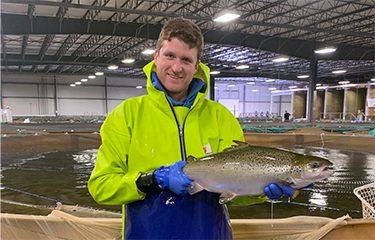With AquaBounty Technologies’ first commercial-scale harvest of conventional Atlantic salmon raised in the U.S. in June, and the first harvest of its genetically engineered AquAdvantage Salmon expected to follow later this year, the company is nearing a turning point toward production and, more importantly, profitability.
The publicly listed company recently announced the pricing of its previously announced underwritten public offering, of 11,000,000 shares of common stock of the company at a price to the public of USD 2.50 (EUR 2.11) per share, which will gross proceeds of approximately $27.5 million (EUR 23.2 million). Losses for the company increased in 2019, but the company also raised USD 15.5 million (EUR 14.4 million) via a public stock offering earlier this year.
But with salmon products on the horizon instead of in the distant future, it’s only a matter of time before revenue starts rolling in.
“We think [harvesting the first conventional Atlantic salmon] is a pretty big milestone, because there aren't a lot of facilities that size that have raised salmon to harvest weight,” AquaBounty CEO Sylvia Wulf told Seafood Source. “It demonstrates our confidence in raising salmon in a land-based RAS facility.”
The raising of conventional salmon was a route the company took to utilize the facility early on, and it will aim to switch over to solely AquAdvantage salmon in the near future.
Right now, the biggest hurdles for the company are setting up an effective supply chain and establishing a customer base for its salmon.
“I think the thing that is most exciting to me is that the U.S. really does have an opportunity to become a country that has a thriving aquaculture business,” Wulf said. “Seafood is a healthy protein and the self-sufficient design of land-based RAS farms is a tremendous opportunity. And I think the time for that is know – we’re excited to be a part of it.”
While the time might be right in the grand scheme of things, the company does face some challenges due to the ongoing COVID-19 pandemic.
“Salmon pricing is depressed. Coming to market during the pandemic has created its own set of challenges, but they're not unique to AquaBounty.” Wulf said. “The good news is, I think that the pandemic did expose the fragility of the supply chain. And having the ability to farm salmon domestically has proved to be a nice complement to wild-caught fisheries.”
The company is closely watching shifting demand and pricing for seafood as consumers navigate the pandemic, and is hoping it will even warm consumers up to its upcoming AquAdvantage salmon debut.
“There's a very, very high likelihood that the vaccine for COVID-19 will be a biotechnology innovation. And consumers are, I think, becoming more receptive to what biotechnology can do for people for the planet,” she said. “We shouldn't be afraid of genetic engineering, because it very specifically can address a number of the challenges that we face.”
Consumer research released by AquaBounty earlier this year indicated that the majority of consumers are willing to try genetically engineered salmon. The research also showed that most consumers have a lot of confusion regarding what is and isn’t genetically modified. Often times consumers are already eating a genetically modified product, even if they don’t realize it.
Of course, there are still organizations and advocates in the other corner that are very against genetically-modified food products. A coalition of GMO labeling advocates recently sued the federal government to force changes to the federal GMO labeling law. The lawsuit, against the USDA, Secretary Sonny Perdue, and Agricultural Marketing Service Administrator Bruce Summers, was filed by Natural Grocers, Citizens for GMO Labeling, Label GMOs, Rural Vermont, Good Earth Natural Foods, Puget Consumers Co-op, and the Center for Food Safety.
The plaintiffs are pushing for the required symbol for genetically-engineered products – which currently denotes products as "Bioengineered" or "Derived from Bioengineering" – to use the more common terminology "genetically modified" or "genetically engineered."
"This case is about ensuring meaningful food labeling, the public's right to know how their food is produced, and retailers' rights to provide it to them," said George Kimbrell, CFS legal director and counsel in the case, in a press release. "The American public successfully won GE food labeling after more than a two-decade fight, but the Trump rules fall far short of what consumers reasonably expect and the law requires."
Labeling and approvals is a fight AquaBounty has plenty of experience with – the company gained the Food and Drug Administration’s approval back in 2018, and later had an import alert lifted. The company has also navigated opposition in Canada, and its own consumer research has shown GE food is an issue for only a small percentage of consumers.
Now, AquaBounty is looking to open two new farms down the line – at least one in the U.S., potentially in the Mid-West. Wulf said the company is in the latter stages of evaluating the top potential sites for a new location and that an announcement could come as early as September. The company could break ground in early 2021.
Photo courtesy of AquaBounty







